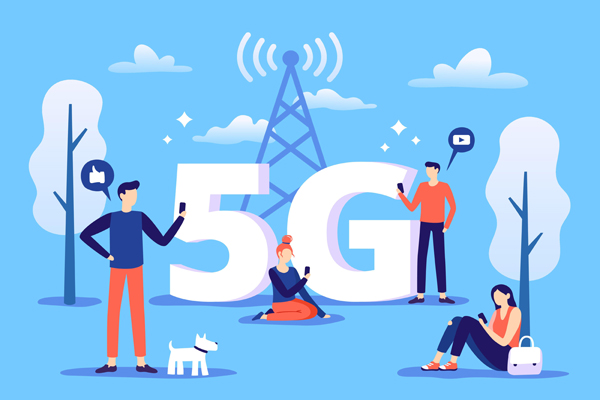5G and AI Use Cases – How 5G is enabling AI

5G and AI Use Cases – How 5G is enabling AI
Michael Baxter said that 5G will unlock the potential of artificial intelligence. But how will AI and 5G impact our daily business lives to the greatest extent? What are the use cases for 5G and AI?

Convergence makes 5G and AI use cases exciting: 5G can spark an AI revolution, push it to different areas and create new AI use cases.
When Apple introduced the iPhone, few people understood its importance. Of course, there is a reason for this. At the time of the 2007 release, wireless internet was quite slow. 3G was introduced in 2001 by NTTDeCoMo, but network deployment has evolved incrementally. The convergence of touchscreen phones with 3G and 4G has created demand that few anticipated.
"The importance of AI will go hand in hand with the advent of 5G"
There's also the problem – with the emergence of popular applications, the demand for 3G surges, and 3G networks become strained, thus accelerating the arrival of 4G.
The 5G revolution
According to Allied Market Research, the valuation of the global 5G market will grow from $5.13 billion in 2020 to $797.8 billion in 2030.
IDTechEX came to a similar conclusion. In a recent report, it concluded: "The 5G market is about to take off. It predicts that consumer mobility services using 5G technology will generate about $800 billion in revenue by the end of 2032.
Dr. Yu-Han Chang, IDTechEX 5G Technical Analyst, said: "5G enables larger data streams and faster data collection, allowing AI to generate more accurate models and predictions.
"Together, 5G and AI will accelerate the development of a fully connected and intelligent world."
5G is expected to be more than 100 times faster than 4G, which may seem like an incredible growth, but applications will emerge to fill the opportunities created.
5G is expected to be more than 100 times faster than 4G, which may seem like an incredible increase, but applications will fill the opportunities it creates.
As always, complications arise when you delve into these things. In fact, there are two distinct 5G networks.
On one level, mmWave operates at 100 MHz, offers frequencies between 24 - 100 GHz (gigahertz) and offers impressively low latency, but is limited to 300 meters of coverage.
In contrast, Sub-6 GHz operates at 50 MHz with greater latency than mmWave but better than 4G, offering frequencies between 3.5 – 7 GHz but with a range of 1.5 km.
In other words, mmWave can support more powerful applications, but requires more infrastructure investment due to smaller coverage. As a result, most 5G deployments to date have been for sub-6 GHz.
The impact of 5G on artificial intelligence
The impact of 5G on artificial intelligence will not be immediate, but it will be significant.
While AI may be more prevalent than commonly believed, its impact has so far been limited. So while most of us use AI without realizing it, for example, when we use our smartphones as a navigation tool, the real impact of AI is at hand.
With the advent of 5G, artificial intelligence is becoming increasingly important. The convergence of these two technologies will have a huge impact on all of us, will have huge economic implications, and will transform many enterprise businesses.
5G, IoT, and artificial intelligence will drive use cases
The Internet of Things (IoT) will underpin the convergence between 5G and artificial intelligence.
Adam Bujak, CEO and co-founder of KYP.ai, a process intelligence company, said: "5G will drive the development of the Internet of Things. It will allow organizations to use more connected devices and smart sensors.
"By using connected devices and services, we will be able to conduct our processes in a more digital way, both physically and online. As a result, we will see growth in phygital [physical + digital] products and services, including virtual reality operating models and customer interactions. ”
"The high throughput and ultra-low latency of 5G [and mmWave in particular] enables it to enter a variety of high-value areas, such as 3D robot control, virtual reality monitoring, and telemedicine control that were not possible with earlier technologies," IDTechEX said. ”
Use cases based on IoT and the convergence of 5G and artificial intelligence
We will see connectivity between products that have never been seen before. At some level, we may see coffee cups communicating with coffee vending machines; But on another level, we'll see the interconnectivity of self-driving cars, which has significant implications for the future of transportation.
The data collected by IoT will also provide the resources needed for machine learning or AI to develop and create deeper insights.
5G and AI Use Cases – Consumers
The convergence of 5G and artificial intelligence will support the emergence of the metaverse.
The overhype about the metaverse in 2021 is offensive. Part of the problem here has to do with the definition of the metaverse. On the one hand, it conjures up the idea of a virtual world, but in reality, its meaning is more prosaic. Some even say that Zoom calls involve the metaverse, which they define as a combination of the digital and physical worlds.
Virtual reality and augmented reality, or immersive reality, will be the foundation of the virtual world, while 5G and artificial intelligence will change it.
The convergence of 5G and AI will create new use cases in gaming and streaming services, such as 3D and virtual reality viewing that supports how we communicate. It will also transform social media.
The convergence of AI and 5G will also create tools that we will use in our daily lives – for example, real-time language translation tools.
AI 和 5G 的 B2B 用例
Business-to-business applications will be many, but one of the most important aspects will be the support that 5G provides for remote work. Take, for example, how Grammarly supports text communication. But with advances in virtual reality and augmented reality, it's not hard to imagine 5G and AI changing not only remote work, but also mobile work.
- automation
Still, with B2B, there is also the problem of automation technology.
Adam Bujak said: "5G will expand the scope of digital transformation and bring us more opportunities for innovation and automation. We'll get more data and insights from all these physical processes and connected devices, allowing us to train AI and leverage it for business and process analytics. In turn, result-driven automation of intelligent services will open up more possibilities. ”
- industry
Office automation is an opportunity, but the combination of 5G and AI will also support industry and manufacturing; On the one hand, it will be able to support equipment maintenance, monitor machines and detect potential problems in advance, but it also presents the attractive prospect of remote operation of machines.
- Transportation
AI and 5G working in parallel will transform the connectivity of transportation, including autonomous vehicles, drones, and transportation infrastructure, such as ensuring that traffic lights support optimal traffic flow.
- Healthcare
The opportunities presented by AI and 5G in healthcare are manifold, but one of the most enticing will be related to remote monitoring when patients are on the go.
Now is just the beginning
But more AI and 5G use cases will emerge; That's just the beginning. The convergence of these technologies will prove very important and will unleash artificial intelligence, ultimately justifying much of the hype of the past decade.